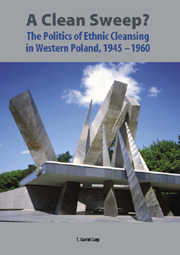Book contents
- Frontmatter
- Contents
- Acknowledgments
- Introduction: Hearts and Minds and Land: Ethnic Cleansing and the Stabilization of Postwar Poland
- 1 How the East Was Lost: Germany's Struggle for the Polish-German Borderlands, 1870–1945
- 2 Who Won the West: The Colonists and Ethnic Cleansers of Poznań and Eastern Brandenburg in 1945
- 3 Acts of Sacrifice: Poland's Ethnic Cleansing and the End of Political Pluralism, 1945–47
- 4 Counterrevolution from Above and Abroad: The Delocalization of Politics and the Beginning of Polish Stalinism's Antinational Counterrevolution, 1947–49
- 5 Waging Counterrevolution: The Party-State's Struggle for Hearts, Minds, and Land in Wielkopolska, 1949–53
- 6 Revolutions before the Revolution: National Solidarity and the Long Retreat of Stalinism in Wielkopolska, 1953–56
- 7 The Revolutions Betrayed? The Poznań Revolt and the Polish Road to Nationalist Socialism, 1956–60
- Conclusion: A Near Run Thing From National Solidarity to Solidarity
- Abbreviations
- Notes
- Bibliography
- Index
Introduction: Hearts and Minds and Land: Ethnic Cleansing and the Stabilization of Postwar Poland
Published online by Cambridge University Press: 12 September 2012
- Frontmatter
- Contents
- Acknowledgments
- Introduction: Hearts and Minds and Land: Ethnic Cleansing and the Stabilization of Postwar Poland
- 1 How the East Was Lost: Germany's Struggle for the Polish-German Borderlands, 1870–1945
- 2 Who Won the West: The Colonists and Ethnic Cleansers of Poznań and Eastern Brandenburg in 1945
- 3 Acts of Sacrifice: Poland's Ethnic Cleansing and the End of Political Pluralism, 1945–47
- 4 Counterrevolution from Above and Abroad: The Delocalization of Politics and the Beginning of Polish Stalinism's Antinational Counterrevolution, 1947–49
- 5 Waging Counterrevolution: The Party-State's Struggle for Hearts, Minds, and Land in Wielkopolska, 1949–53
- 6 Revolutions before the Revolution: National Solidarity and the Long Retreat of Stalinism in Wielkopolska, 1953–56
- 7 The Revolutions Betrayed? The Poznań Revolt and the Polish Road to Nationalist Socialism, 1956–60
- Conclusion: A Near Run Thing From National Solidarity to Solidarity
- Abbreviations
- Notes
- Bibliography
- Index
Summary
Roman Dmowski was an excellent analyst, but he was a prisoner of his phobias. … He shaped Polish minds and depraved Polish consciences.
He shaped them by developing the ideas of a politics of activism, teaching them about geopolitics, injecting harsh realism: he degraded them by formulating a concept of the nation and an idea of Polishness that led straight to totalitarian solutions.
—“Conversation in the Citadel,” Adam MichnikThe relative stability of Polish society in the decades following World War II presents something of a puzzle. By 1970, that stability gave way to a series of crises that generated domestic and international instability for much of the following twenty years, during which Polish society was in a state of “permanent revolution,” deeply alienated from its government. From the opposition's perspective, this revolution was part of an ongoing struggle that Poles had waged since the end of the war against the ruling minority who supported the Soviet-backed Communist-dominated party-state. Eventually the Polish people, led by liberal and Catholic dissidents and labor activists, forged a revolutionary mass movement, Solidarity. Solidarity's struggle for human rights, the material well-being of the Polish people, and the sovereignty of Poland undermined the foundations of the party-state. In 1989, Solidarity freed Poles from Communist rule, setting the stage for the collapse of the Soviet empire in Eastern Europe and the liberation of the entire region.
- Type
- Chapter
- Information
- A Clean Sweep?The Politics of Ethnic Cleansing in Western Poland, 1945–1960, pp. 1 - 12Publisher: Boydell & BrewerPrint publication year: 2006



